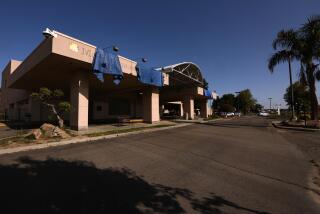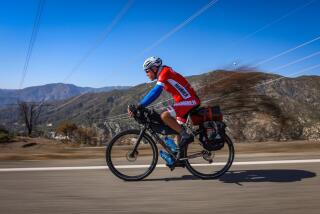He Just Wants a Chance to Begin Again : Mission Viejo Coach, 26, Waits for Kidney, Heart Transplants
- Share via
New kidneys, a new heart and $10,000. This is what Jeff Bergan needs.
He needs new kidneys because, without them, he’ll remain hooked to a dialysis machine--three times a week, four hours a day--for the rest of his life.
He needs a new heart because, without one, the doctors have told him, the rest of his life amounts to less than two years.
He needs $10,000 because, without that, the kidneys and the heart may not be possible.
What Jeff Bergan wants--to continue to coach wrestling and freshman football at Mission Viejo High School without the windfall of questions on how he feels today , to have his body delivered back to him from all the doctors, needles and machines--really doesn’t matter right now.
This is a time of hard edges and plain truths with no room for bitterness or blame.
Who do you blame for kidneys so damaged that Bergan is allowed only six cups of liquid, in any form, a day? Exactly what department do you complain to about a heart that works at 20% capacity?
“We’ve all shook our fists at the sky and asked why,” said Sandy Bergan, Jeff’s mother. “We’ve all had a good cry. Now it’s time to be strong for Jeff.”
Bergan, 26, may become the first person on the West Coast to receive a simultaneous kidney and heart transplant. The operation, according to Bergan’s cardiologist, Dr. Donald Redicker, has been performed three times in the United States, all three times at Johns Hopkins Hospital in Baltimore.
Redicker said the simultaneous transplants are preferable because Bergan’s body will have an easier time accepting the protein of a set of organs from the same donor.
It was Redicker who “sold” Bergan’s case to Stanford’s Cardiology Center after failing with two other hospitals, one of which said that Bergan’s case was too risky.
“That’s the way things are done,” Bergan said. “You have to sell your problems to the surgeons. They make their decision from who needs it the most and the money. The money is a big part of it.”
It was in the spring of 1986 that Bergan first suspected that something was wrong. Severe leg cramps woke him in the middle of the night. He was tired all the time. He would get tingling sensations all up and down one side of his body while sitting in class at Cal State Fullerton. Finally, he went to the Cal State Fullerton health center and was diagnosed as having kidney problems.
“They function at about 5%,” Bergan said.
Doctors believe the kidneys were damaged when Bergan developed high blood pressure. Soon after the diagnosis, the dialysis treatment began. Dialysis is a process by which blood is circulated though a machine and cleansed of its impurities. Bergan calls it “becoming a human pin cushion.”
A vein and artery were grafted in his left arm to make it easy to insert a large needle for dialysis. The graft, called a fistula, pushes up the skin along the length of his forearm as if someone had inserted a garden hose there. It is not pretty, and it is one of the few signs that this very healthy-looking man has something very wrong with him.
It was during the 1987 Christmas holidays that Bergan found out about his heart. His lungs were filling with fluid, his heart took an extra beat. There was an enormous amount of pressure in his chest.
“He was breathing so hard, it scared the hell out of us,” Sandy Bergan said.
Bergan was taken to a hospital for an echocardiogram, what he calls a videotape of the heart. He was informed soon after that he had the heart of a not-very-healthy 70-year-old. He had been afflicted with cardiomyopathy, a disease of the heart’s muscle fibers.
“They told me without a heart transplant, I had two years to live,” Bergan said.
The operation will cost about $125,000. Life doesn’t come cheap. Bergan hopes Medi-Cal--a federal medical insurance program administered by the state--will take on the costs of the operation and hospital. Redicker said he’s confident Medi-Cal will, but as of yet, Bergan has yet to receive any definite word. If Medi-Cal decides not to, there will be no transplants at Stanford.
If and when Medi-Cal comes through, Bergan would go to Palo Alto and rent an apartment near Stanford. He will be given a beeper so the hospital can alert him at any time if a donor becomes available so he can come in for the surgery. Until then he will wait, and that’s where the $10,000 comes in.
Bergan will still have to pay for rent, food, utilities and a lot of other things that medical insurance doesn’t cover. If he can’t afford the living costs, Stanford will not accept him.
“If you don’t have the money, they’re not going to touch you,” Bergan said. “There’s plenty of other people trying to get into their program. They can always help someone else.”
A group working out of Mission Viejo High started raising money for Bergan about three weeks ago. So far they have raised about $4,000 from clubs and private parties. The Mission Viejo wrestling team soon will hold a “push-up-athon” for money.
“The response has been really good,” said Randy Edwards, Mission Viejo’s dean of students and one of the organizers of the fund-raising. “We’ve had people just walk into the office and just hand over some cash for Jeff. All people have to do is call up the school and we’ll tell them how to make a donation.”
Once at Stanford, Bergan may wait a week, or he may wait six months. According to Redicker, about a third of the patients at the the Cardiology Center die waiting.
“Just because he’s up there doesn’t mean he’s on easy street,” Redicker said.
No one knows when the operation will take place because the materials most necessary to bring Bergan into an operating room depend on the most unpredictable of circumstances.
“Someone is going to have to die for my son to live,” Sandy Bergan said.
According to Redicker, the donor’s body must still be functional so that the vital organs remain working. The likely candidate is a motorcyclist, not wearing a helmet, who crashes and is subsequently declared brain-dead. Most likely, the donor would come from Southern California.
“There are more people in Southern California and more freeways,” Redicker said. “That’s simply the facts.”
A surgeon from Stanford will be dispatched in a private jet to the donor’s area, carrying a cooler in which to place the vital organs. After getting them, the surgeon will get back on the airplane and fly back to Stanford. Not long after that, Bergan’s beeper will sound.
“The whole thing sounds a bit spooky,” Bergan said. “But what’s my alternative? I think you know what my alternative is, and I’m not ready for that.”
Bergan thinks about death a lot these days. About the only thing he thinks about more than death, he says, is life. He says the mind tends to wander to the ultimate questions while plugged into a machine.
After all the whys and hows, he said he has come up with only one answer.
“It happened. I can either do something about it or climb in a pine box,” he said. “And there’s no use feeling sorry for myself, because then I’m only making my life more miserable. I don’t want to live that way.”
He graduated from Mission Viejo in 1981. He had made a name for himself and won a couple of All-South Coast League awards as a 200-pound defensive tackle. He lifted weights and trained like a fiend. Quiet, almost a loner during school hours--”I was terrified of most people, especially girls”--he expressed himself on football fields and wrestling mats.
“The most aggressive kid I’ve ever come across,” said Edwards, who was Bergan’s defensive line coach at Mission Viejo as well as his wrestling coach. “Nothing came easy for Jeff. He accomplished things by working harder. He always prided himself on that.”
And so it’s not surprising that when the medical problems mounted, Bergan wished he could sit in a weight room for a couple of hours and simply make his heart get stronger, sweat out everything that was wrong with him.
“They tell me the best thing I can do for myself is take it easy,” he said. “But that goes against everything I’ve ever been accustomed to. I’m use to fighting my own battles. It’s strange for me to have to depend on someone else. But this thing has opened my eyes that I really do need other people.”
Other people, new kidneys, a new heart and $10,000.
More to Read
Sign up for Essential California
The most important California stories and recommendations in your inbox every morning.
You may occasionally receive promotional content from the Los Angeles Times.










